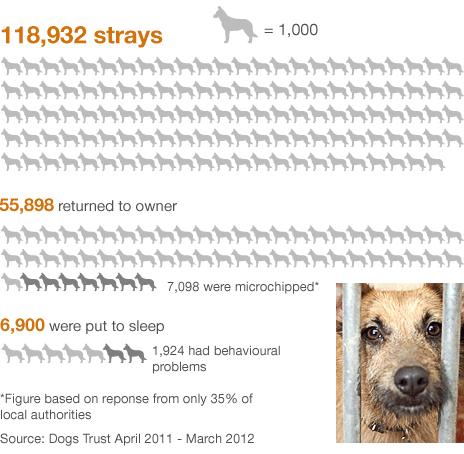Dogs in England must be microchipped from 2016
- Published
- comments
Dog microchip date set for England
Every dog owner in England will have to microchip their animal from 2016 under plans intended to cut a rise in strays.
The microchips will be coded with owners' details, and owners who do not comply could face fines of up to £500.
A legal loophole may also be closed, meaning owners could be prosecuted over an attack by their dog on private land.
The RSPCA welcomed the proposals, but said it doubted that they alone would "make owners more responsible or ensure fewer dogs bite people".
Government figures reveal that more than 100,000 dogs are dumped or lost each year, at a cost of £57m to the taxpayer and welfare charities.
Ministers hope the change in the law will help reunite owners with lost or stolen pets and relieve some of the burden on animal charities and local authorities.

Environment Secretary Owen Paterson said: "It's ludicrous that in a nation of dog-lovers, thousands of dogs are roaming the streets or stuck in kennels because the owner cannot be tracked down."
He added: "Microchipping is a simple solution that gives peace of mind to owners. It makes it easier to get their pet back if it strays and easier to trace if it's stolen."
The change in the law will be effective from 6 April 2016. Any owner whose dog is found without a chip and can be traced by local authorities will have a short period of time to have the dog microchipped.
Laws governing dog attacks will also be extended to cover private property, closing a loophole which has meant that dog owners whose animals have attacked people on private property are immune from prosecution.
Welfare warnings
David Bowles, the RSPCA's head of public affairs, said: "Compulsory microchipping and extending the law to cover private property as well as public spaces is a welcome move.
"However, on their own we don't believe they will make owners more responsible or ensure fewer dogs bite people or other animals."
He said that the number of warnings issued to dog-owners because of poor welfare last year had been up 12% on 2011, while in the last four years there had been a 26% rise in the number dog bites requiring hospitalisation.
"If the government are trying to tackle these, we don't see how compulsory microchipping will help reduce either of these figures," he said.
Eight children and six adults have been killed in dog attacks since 2005, with many of these incidents taking place in the home, figures from the Department for Environment and Rural Affairs show.
In the past 12 months, more than 3,000 postal workers were attacked by out-of-control dogs, with 70% of these attacks happening on private property.
But householders will be protected from prosecution if their dog attacks a burglar or trespasser on their land.
Currently some animal charities, such as the Dogs Trust, Blue Cross and Battersea Dogs and Cats home, offer a free microchipping service to owners.
The procedure, which costs about £20-£30 at a private veterinary clinic, involves inserting a sterile chip the size of a grain of rice between a dog's shoulder blades.
Free microchips, donated by the Dogs Trust, will be circulated to veterinary clinics, although it is currently unclear whether vets will charge for the service.
Updating information
Clarissa Baldwin, Dogs Trust: "It's not going to cure all, but it will be a huge help"
Clarissa Baldwin, chief executive of the Dogs Trust charity, said the scheme would make "a huge difference".
Most of the 16,000 dogs looked after by the trust each year had not been microchipped, she told BBC Radio 4's Today programme.
"We could get those dogs back to their worried owners if they have a microchip and are identifiable," she said.
"With a register, kept up to date, people will be able to get their dogs back far more easily."
But Beverley Cuddy, editor of Dogs Today magazine, said the scheme was flawed because many owners did not keep their information up to date.
"The National Dog Warden Association says 40% of the dogs they pick up that are chipped have got incomplete or inaccurate data, meaning they can't be returned," she said.
"People don't know how to update their records. The chip is invisible - once it's in there people forget it's there. "
Compulsory microchipping was introduced in Northern Ireland in April 2012.
Similar plans were considered in Wales in 2012, although no formal policy announcement has yet been made.
The Scottish government has said that, while it recognised the benefits of microchipping, there was "no evidence compulsory microchipping would effectively tackle welfare issues".
A spokesman added that Holyrood would watch developments in the rest of the UK and "may consider the matter further in future".
- Published6 February 2013
- Published8 April 2012